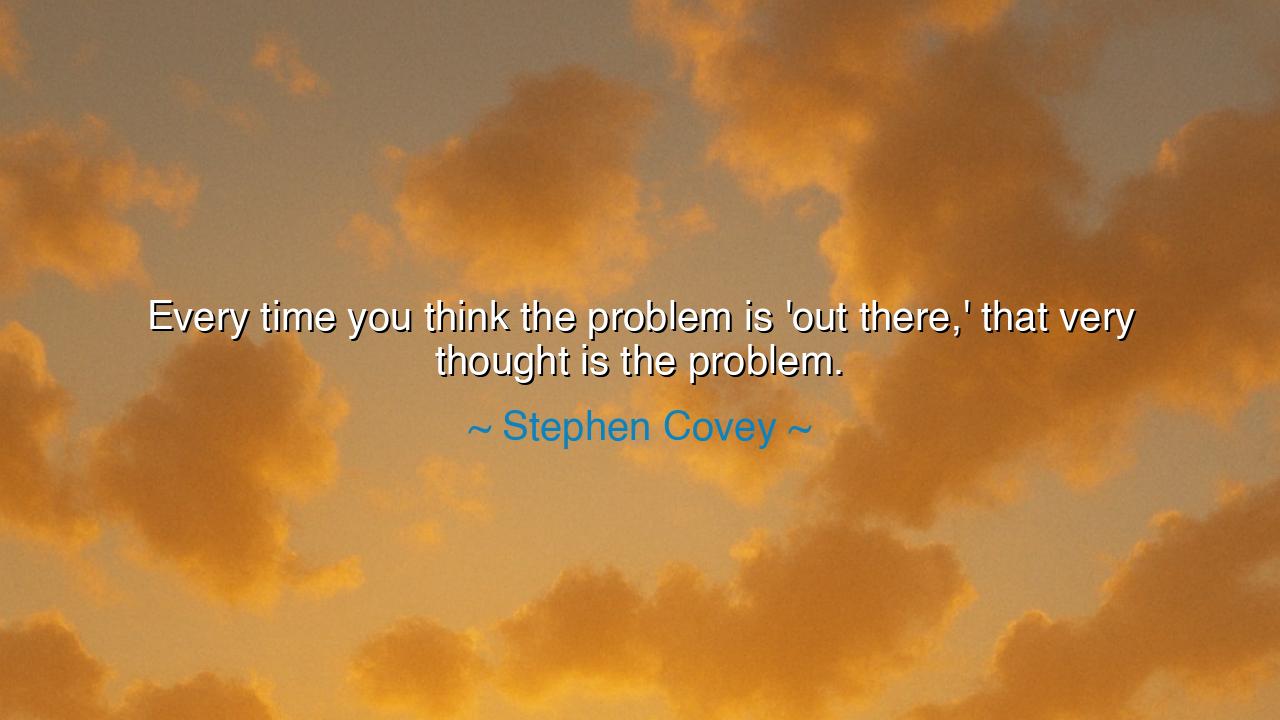
Every time you think the problem is 'out there,' that very






The words of Stephen Covey, “Every time you think the problem is ‘out there,’ that very thought is the problem,” are a summons to self-mastery, a call to look inward rather than outward when confronted with struggle. Covey, the author of The 7 Habits of Highly Effective People, understood that the root of transformation lies not in blaming circumstances, governments, or other people, but in taking responsibility for one’s own choices. His words reveal the ancient truth that while we cannot always command the winds, we can always adjust our sails.
At its heart, this quote is about the power of ownership. The human mind is quick to find fault in the world—blaming the unfair boss, the corrupt system, the ungrateful friend, the unpredictable economy. Yet Covey warns that this very impulse is a trap. For the moment you declare the problem lies beyond yourself, you also declare that the solution lies beyond your reach. In this way, blame becomes a prison. But when you turn the gaze inward, you rediscover your freedom—the freedom to change your attitude, your response, your action.
The origin of Covey’s insight lies in his lifelong study of leadership and human behavior. He drew from both modern psychology and timeless wisdom traditions, echoing the Stoic philosophers who taught that while man cannot control the external world, he can always govern his mind. Marcus Aurelius, the Roman emperor, once wrote: “You have power over your mind—not outside events. Realize this, and you will find strength.” Covey’s words are a modern echo of this ancient teaching, urging us to stop seeing ourselves as victims of the world, and instead as creators within it.
History itself gives us shining examples of this principle. Consider Nelson Mandela, imprisoned for 27 years under an unjust system. He could have blamed endlessly—his captors, the government, the hatred of apartheid. Yet he chose another path: he looked inward and cultivated forgiveness, patience, and resilience. When he was finally released, he did not emerge broken, but unshakable, ready to lead his nation to freedom. If Mandela had believed the problem was “out there,” he would have remained a prisoner in spirit even after leaving his cell. Instead, by mastering himself, he mastered the future.
The deeper wisdom here is that responsibility is not a burden, but a source of power. To take responsibility is not to say that injustice does not exist, nor that others cannot cause harm. It is to say that your response is yours alone. The man who blames the world is powerless; the man who owns his choices cannot be conquered. In this way, Covey points us to a path of empowerment: the greatest freedom is not in controlling the world, but in controlling ourselves.
To the seekers of wisdom, let this truth be your guide: each time you feel anger rising against the world, pause and ask, “What can I do? How can I respond differently? What lies within my control?” The shift from outward blame to inward responsibility is the turning point of growth. It is the moment when you cease being a pawn of circumstance and begin to walk as the master of your destiny.
The practical lesson is clear: in your family, your work, your community, resist the urge to point the finger outward. Instead, look inward. If there is conflict, ask how you can bring peace. If there is failure, ask how you can learn and adapt. If there is injustice, ask how you can act to bring change. In this way, you transform problems from distant enemies into personal opportunities for growth and leadership.
Thus, let Covey’s words endure as a compass: the problem is not “out there.” The problem is the belief that it is. When you claim responsibility, you claim power; when you shift blame, you surrender it. Choose responsibility, and you will find strength. Choose self-mastery, and you will discover freedom. And in that freedom lies the power to change not only yourself, but the world around you.






AAdministratorAdministrator
Welcome, honored guests. Please leave a comment, we will respond soon